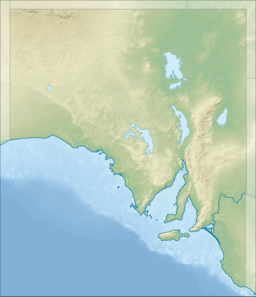Maupertuis Bay facts for kids
Quick facts for kids Maupertuis Bay |
|
|---|---|
| Location | Flinders Chase, South Australia |
| Coordinates | 35°59′46″S 136°39′36″E / 35.996°S 136.66°E |
| Type | Bay |
| Primary inflows | Rocky River |
| Basin countries | Australia |
| Max. length | 13 kilometres (8.1 mi) |
| Max. width | about 3 kilometres (1.9 mi) |
| Average depth | 30–60 metres (98–197 ft) |
Maupertuis Bay (also known as Baie Maupertuis in French) is a bay located on the south-west coast of Kangaroo Island in South Australia. It is a beautiful part of the coastline, known for its natural beauty.
Contents
Where is Maupertuis Bay?
This bay is found on the south-western side of Kangaroo Island. It stretches for about 13 kilometers (8 miles). The bay is about 3 kilometers (2 miles) wide. It faces towards the south-west. The coastline of Maupertuis Bay is part of the area called Flinders Chase. This area is well-known for its national park.
Rivers Flowing In
The Rocky River flows into Maupertuis Bay. This river starts its journey in two important natural areas. These areas are the Flinders Chase National Park and the Ravine des Casoars Wilderness Protection Area. These places help protect the local wildlife and plants.
How Maupertuis Bay Got Its Name
The bay was named by a French explorer named Nicolas Baudin. He named it after a famous French mathematician and philosopher. This person was called Pierre Louis Maupertuis. Baudin explored the coasts of Australia in the early 1800s.
A Shipwreck Story
On April 24, 1899, a Scottish sailing ship called the Loch Sloy was wrecked near Maupertuis Bay. Sadly, most of the people on board did not survive. Only three crew members and passengers were rescued. This event is a reminder of the dangers faced by sailors in the past.
Protecting the Bay's Waters
Since 2012, the waters of Maupertuis Bay have been part of a special protected area. This area is called a "habitat protection zone." It is located within the Western Kangaroo Island Marine Park. The Government of South Australia manages this marine park. A habitat protection zone helps to keep the natural environment safe. It protects the homes of many sea creatures. This ensures that the bay's marine life can thrive for many years to come.
 | Bayard Rustin |
 | Jeannette Carter |
 | Jeremiah A. Brown |


